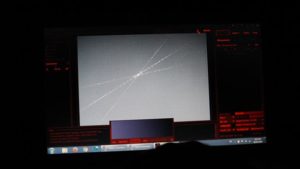Farpoint Cokin Z Camera Filter Bahtinov Focus Mask is an ingenious new way to easily focus your DSLR camera, webcam or CCD camera for astrophotography.
Farpoint Cokin Z Camera Filter Bahtinov Focus Mask is an ingenious new way to easily focus your DSLR camera, webcam or CCD camera for astrophotography. Pavel Bahtinov, a Russian amateur telescope maker and astronomer, created this simple, very intuitive method and the device has universally been named after him: The Bahtinov Mask.
This Bahtinov Focus Mask mounts on to a Cokin Z camera filter cell. Mask is 103mm square.
The Bahtinov focus technique works best with longer focal lengths and becomes less useful with shorter focal lengths. The practical useful limit is around 100mm focal length or longer.
Farpoint Bahtinov Masks Are one of the best tools for manually focusing your telescope available to astrophotographers. In 2005, Pavel Bahtinov, a Russian amateur telescope maker and astronomer detailed a new way to easily focus your DSLR, CMOS or CCD camera for astrophotography by adding a mask that matches the diameter of your telescope.
Bahtinov mask are a less expensive method of getting focus on objects in the night sky compared to a standard motor focuser.
With the right mask and setup it’s easy to get crystal clear focus on a star in less than 90 seconds.

The slits in the mask are the focus assist, when the star is in focus it will appear on your screen display as an “X” with a line through the center (see above).
These mask will work equally as well on the end of a scope or on the end of a dew shield on top of that the mask itself does not need to be perfected centered on the scope this is due to the angle of the slits themselves.
Select a bright star, this will be your guiding object. Place the Bahtinov focusing mask on your telescope’s lens and secure it into place using the provided rubber tabs.
The slits in the mask design create a set of diffraction spikes on the star that will assist in the accuracy of our focus. It will appear on your DSLR display screen or computer as an “X” with a line through the center (when in focus).

As you adjust the focuser of your telescope, the central spike will move in and out of the X-pattern. If you are using capture software be sure to compensate for the lag time between exposures on the screen, typically 4-5 seconds.
The same process applies using Live view display on your DSLR camera. The difference is, the image will be much dimmer, as you are essentially looking at a live video feed rather than a short image exposure.
Farpoint Cokin Z Camera Filter Bahtinov Focus Mask
Farpoint Cokin Z Camera Filter Bahtinov Focus Mask is an ingenious new way to easily focus your DSLR camera, webcam or CCD camera for astrophotography. Pavel Bahtinov, a Russian amateur telescope maker and astronomer, created this simple, very intuitive method and the device has universally been named after him: The Bahtinov Mask.
This Bahtinov Focus Mask mounts on to a Cokin Z camera filter cell. Mask is 103mm square.
The Bahtinov focus technique works best with longer focal lengths and becomes less useful with shorter focal lengths. The practical useful limit is around 100mm focal length or longer.
Farpoint Bahtinov Masks Are one of the best tools for manually focusing your telescope available to astrophotographers. In 2005, Pavel Bahtinov, a Russian amateur telescope maker and astronomer detailed a new way to easily focus your DSLR, CMOS or CCD camera for astrophotography by adding a mask that matches the diameter of your telescope.
Bahtinov mask are a less expensive method of getting focus on objects in the night sky compared to a standard motor focuser.
With the right mask and setup it’s easy to get crystal clear focus on a star in less than 90 seconds.

Star in focus via a Bahtinov mask
How it Works
The slits in the mask are the focus assist, when the star is in focus it will appear on your screen display as an “X” with a line through the center (see above).
These mask will work equally as well on the end of a scope or on the end of a dew shield on top of that the mask itself does not need to be perfected centered on the scope this is due to the angle of the slits themselves.
Select a bright star, this will be your guiding object. Place the Bahtinov focusing mask on your telescope’s lens and secure it into place using the provided rubber tabs.
The slits in the mask design create a set of diffraction spikes on the star that will assist in the accuracy of our focus. It will appear on your DSLR display screen or computer as an “X” with a line through the center (when in focus).

The diffraction spike pattern from a bright star using a Bahtinov mask
As you adjust the focuser of your telescope, the central spike will move in and out of the X-pattern. If you are using capture software be sure to compensate for the lag time between exposures on the screen, typically 4-5 seconds.
The same process applies using Live view display on your DSLR camera. The difference is, the image will be much dimmer, as you are essentially looking at a live video feed rather than a short image exposure.
You may also like
Recently viewed










